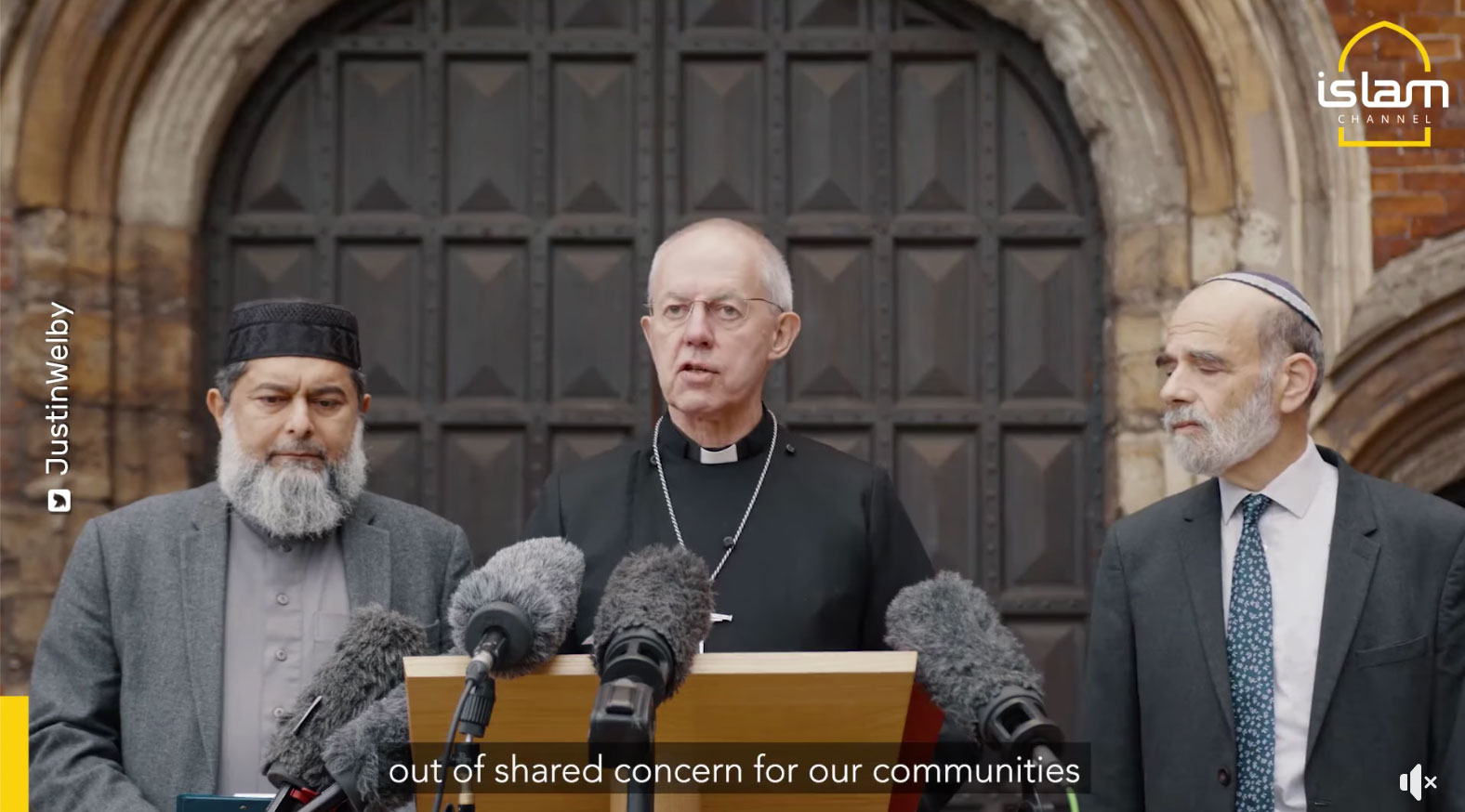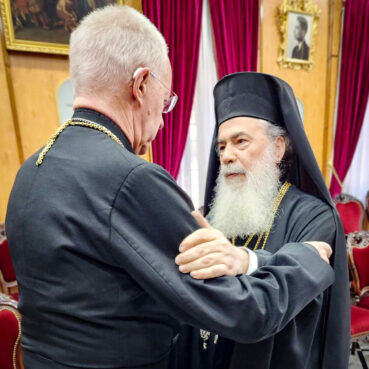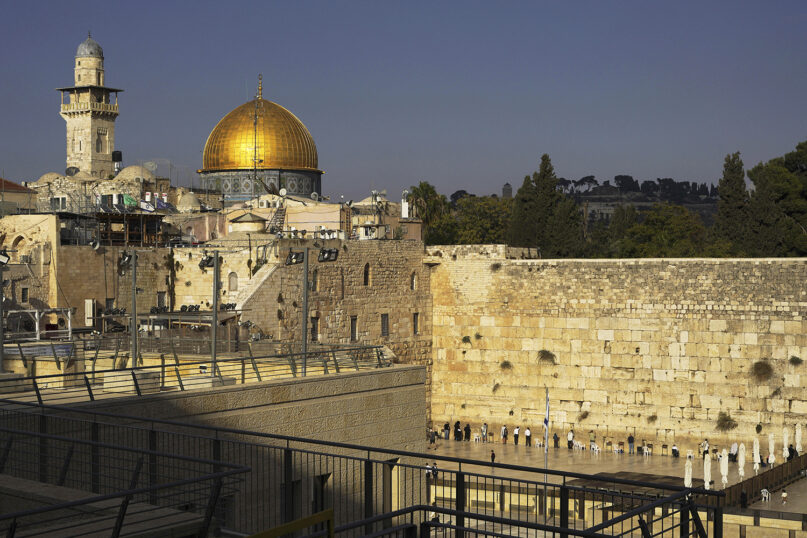LONDON (RNS) — Archbishop of Canterbury Justin Welby arrived in Jerusalem on Thursday (Oct. 19) to show solidarity with Christian communities and leaders there after a missile severely damaged the Anglican-run al-Ahli hospital in Gaza. On Friday, he met with members of the Anglican Church and the Anglican Archbishop of Jerusalem, Hosam Nauom.
But the visit, which is expected to last until Sunday, will also be more wide-ranging, according to a spokesperson at the archbishop’s office at Lambeth Palace, with opportunities to visit leaders of other Christian churches and Jewish leaders as well, and to renew his call for the release of hostages taken during the Hamas attacks on Israel on Oct. 7. He will also express his sympathy for the victims of the Hamas attacks.
While speculation is growing that Welby, Pope Francis and Ecumenical Patriarch Bartholomew of the Eastern Orthodox Church might jointly issue a statement calling for a ceasefire, Welby’s visit will be crucial in helping the Christian leaders understand the value or not of a possible intervention by them.
Welby’s visit is the first by the head of a Christian denomination from overseas since the conflict began.
“This a crucial time for all of us to show solidarity and care to those impacted by this war,” said the Lambeth Palace spokesperson. “At heart of the Christian faith is the idea that the church is one body. When one part of the body suffers, we all suffer. Being alongside our fellow Christians, to listen, share and support is central to our faith. We are praying constantly for all who suffer in the Holy Land.”
Since the current conflict broke out two weeks ago, Welby has roundly condemned the Hamas terrorist attacks on Israeli communities on several occasions, calling them “appalling.” But he has also expressed grave concern at the loss of life in Gaza, called for aid to reach its civilian population and for international humanitarian law to be upheld.
“It is unconscionable that aid is being prevented from reaching children and adults who are not combatants in this war,” Welby, the primate of the Church of England and spiritual leader of the Anglican Communion worldwide, said in a statement Wednesday. “It is indefensible that hospitals, schools and refugee camps are being struck. It is an outrage that hostages are being held by Hamas. The bloodshed, slaughter and suffering of innocent people on all sides must stop.”

Archbishop Justin Welby, Sheikh Ibrahim Mogra and Rabbi Jonathan Wittenberg stood together outside Lambeth Palace in a plea for unity and peace amid the war between Israel and Hamas on Tuesday, Oct. 19. Video screengrab
The Palestinian Christian population in Gaza, which has been falling rapidly in recent years, is now believed to be fewer than 1,000 people out of a total population of 2.3 million. St. Porphyrios, a Greek Orthodox church in the Gaza Strip that was sheltering hundreds of displaced Palestinians, was hit overnight by an Israeli air strike, the Orthodox Patriarchate of Jerusalem said, and Palestinian health officials said 16 people were killed. Another dozen or so are missing.
Tim Livesey, chief executive officer of the British charity Embrace the Middle East, called Welby courageous, saying in an interview, “At such an agonizingly painful and dangerous moment, for the Archbishop of Canterbury to undertake a visit to Jerusalem is brave. It would be much easier to stay home.
“I hope he can persuade people with power not to pursue the path of retribution and violence,” Livesey said. “Christians, Palestinian Christians especially, need global church leaders to stand with them, and if needs be to suffer with them. Together with, and not over against, others. I hope he is able to do that. If he does it will be a comfort for so many who are suffering terribly — Christians, Jews, Muslims — in these very dark times.”
Edward Kessler, founder and president of the Woolf Institute, an interfaith dialogue institute based at Cambridge University, said Welby’s visit “will give sustenance to the local Anglican church, to other churches. So often, Christians in that part of the world feel that they are not being heard.”

Archbishop of Canterbury Justin Welby meets with Patriarch Theophilos III in reaction to the ongoing conflict in Israel. Photo courtesy of the Archbishop of Canterbury X (formerly Twitter)
Kessler added that it is also important for Welby to hear from other faith leaders on the ground in the Mideast. “Religion is not the cause of what is happening, but it is a contributing factor, and the fact that a non-local religious leader has gone out there reflects the consequences of this and is highly significant.”
The archbishop first visited Israel in 2013, when he called for peace and for full access to the holy sites of Jerusalem. In an apparent reference to the security wall erected by the Israelis, he said that Jerusalem must remain an open city. In 2017, he made a 10-day visit to the Holy Land, which took in the Palestinian occupied territories and Jordan as well as Israel.
His predecessor, Rowan Williams, also visited the Holy Land on several occasions and met not only with Christian leaders and communities but also chief rabbis and politicians.
In recent years, some Palestinian Christians have been critical of Western Christian leaders, claiming that they have not spoken out strongly enough about the Palestinians’ plight, due to their fear of upsetting Jewish-Christian dialogue.





